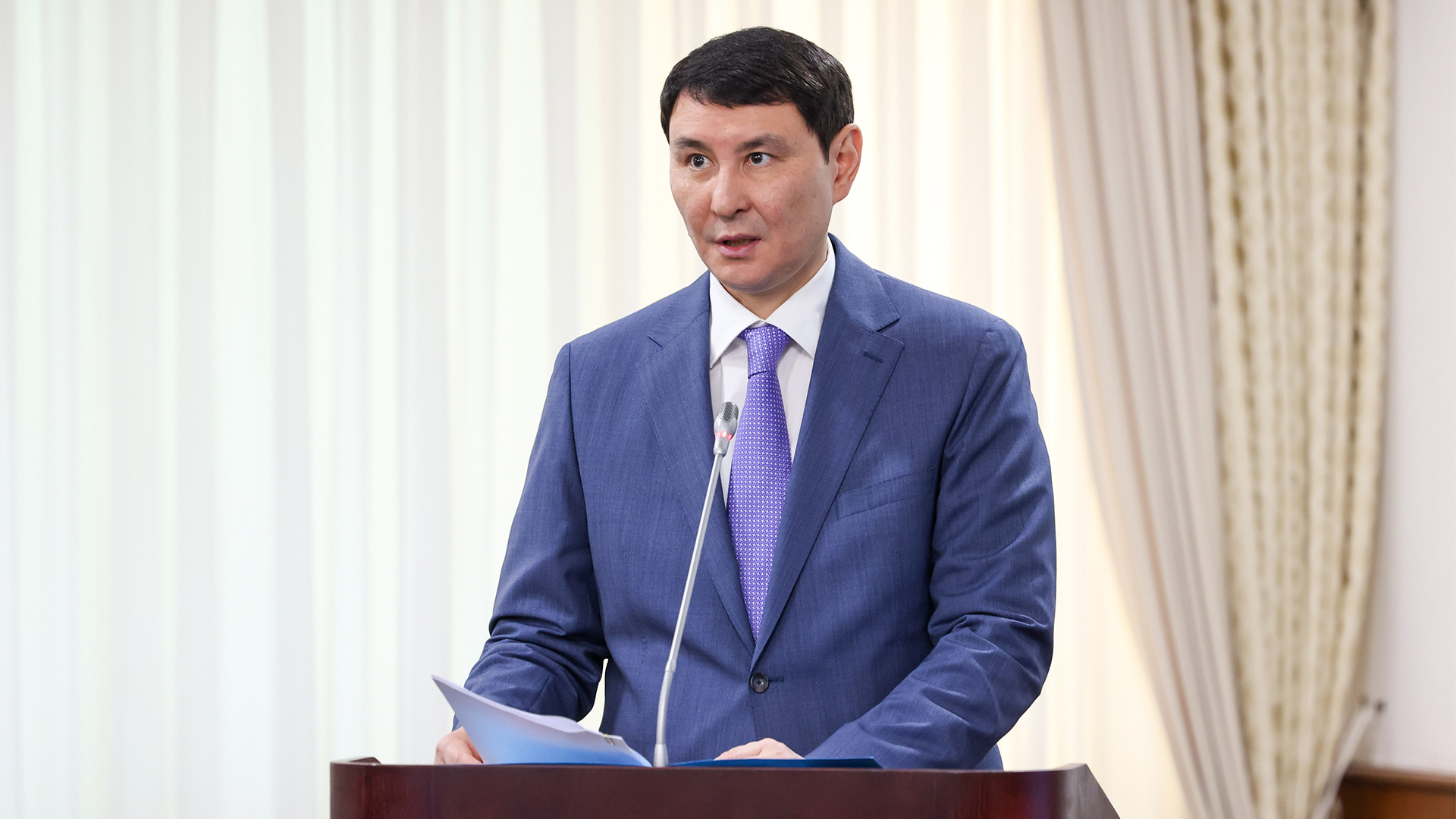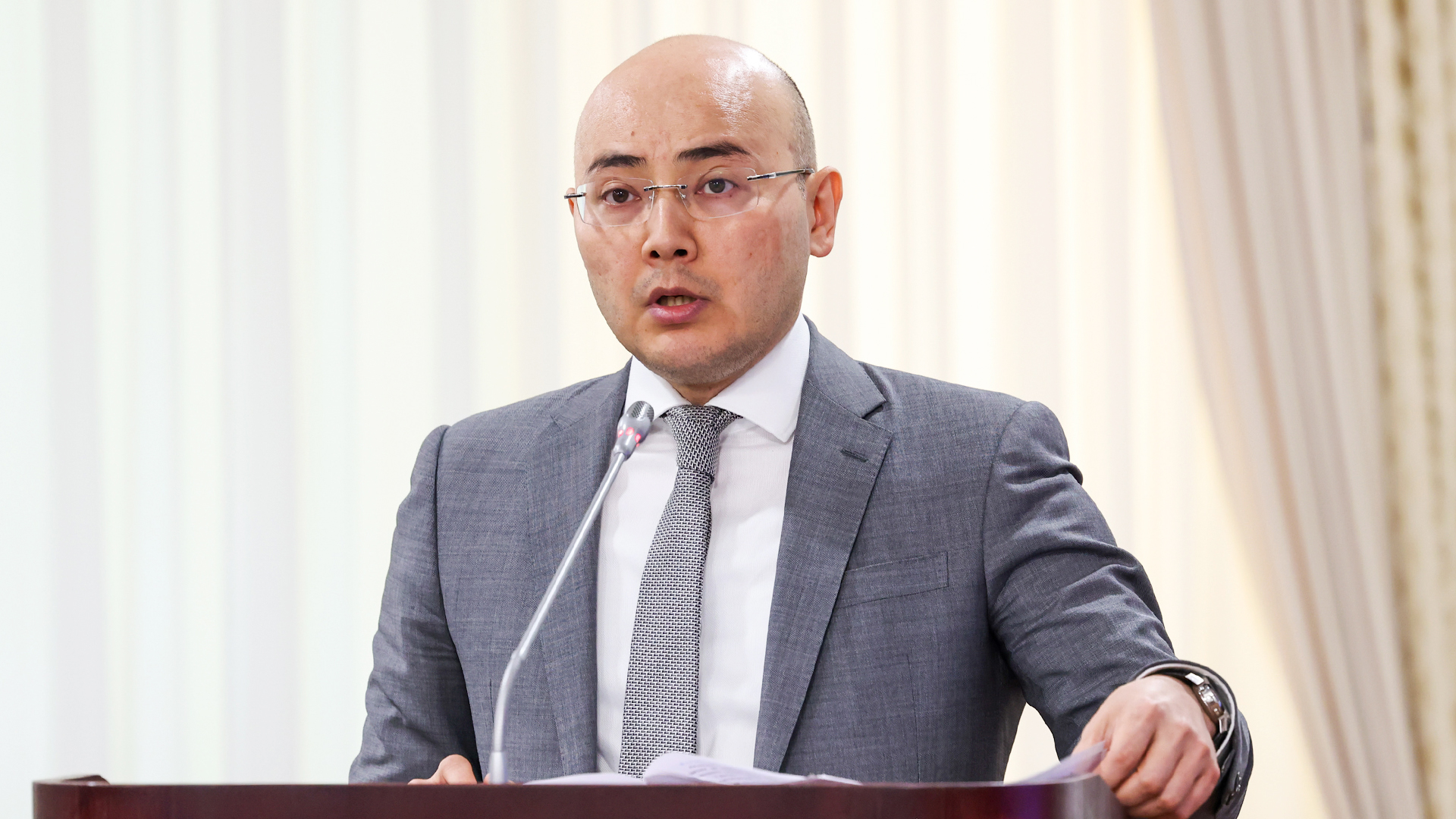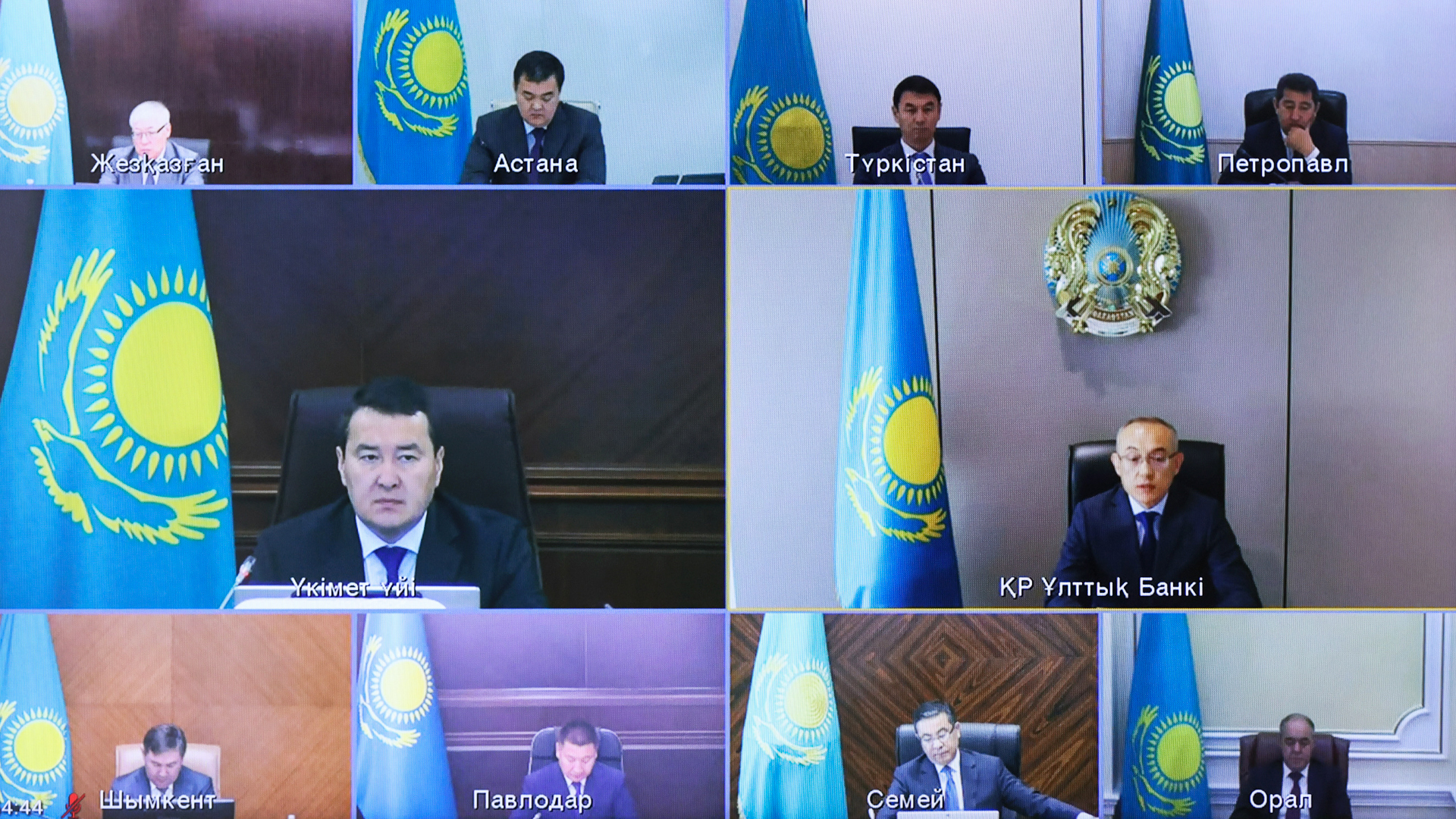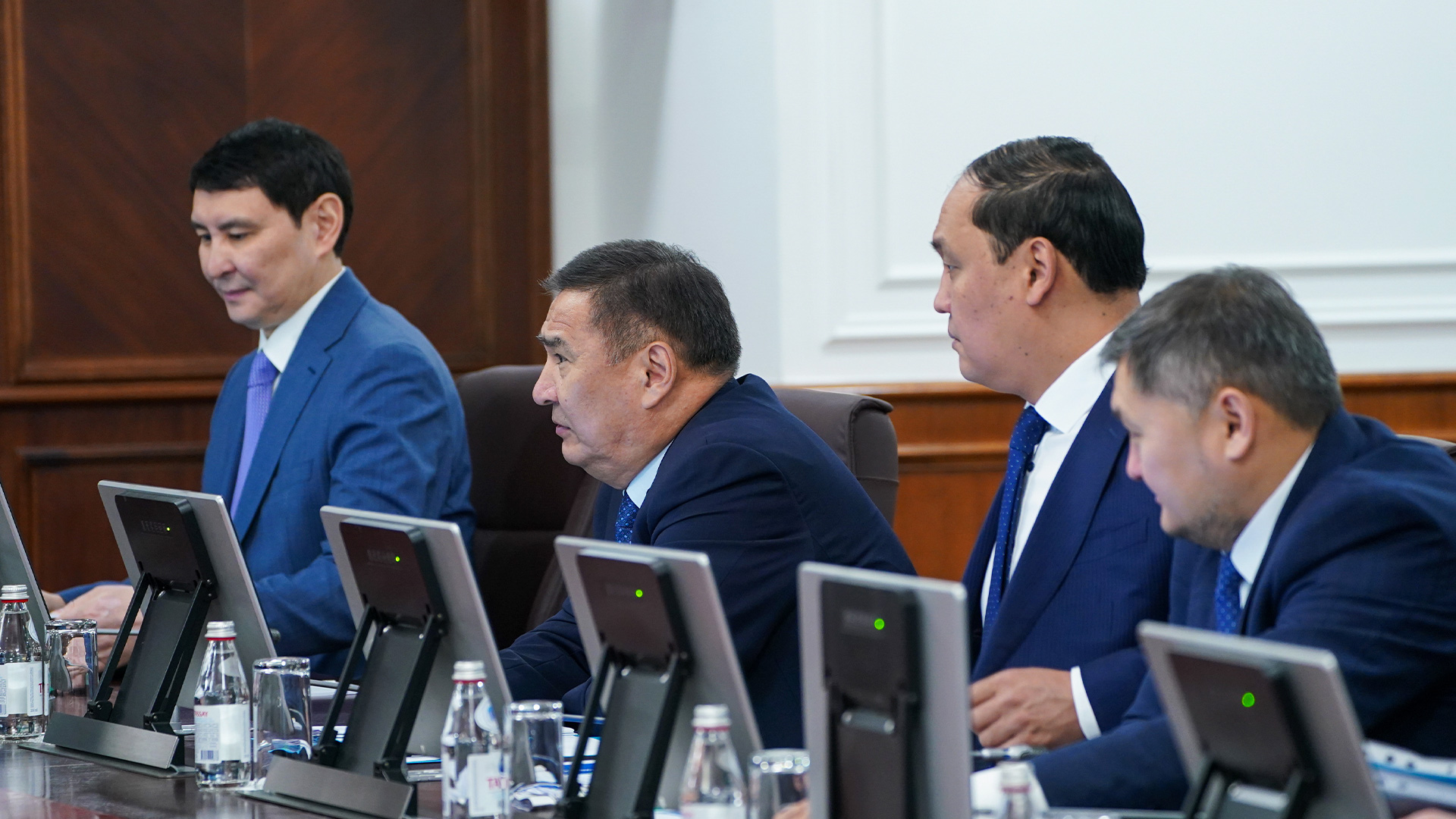13 June 2023, 12:51
 The Government reviewed the socio-economic development of Kazakhstan for the first 5 months of this year and execution of the national budget. The reports at the Cabinet meeting, chaired by Prime Minister Alikhan Smailov, were made by Minister of National Economy Alibek Kuantyrov, Deputy Prime Minister – Minister of Finance Yerulan Zhamaubayev, Chairman of the National Bank Galymzhan Pirmatov.
The Government reviewed the socio-economic development of Kazakhstan for the first 5 months of this year and execution of the national budget. The reports at the Cabinet meeting, chaired by Prime Minister Alikhan Smailov, were made by Minister of National Economy Alibek Kuantyrov, Deputy Prime Minister – Minister of Finance Yerulan Zhamaubayev, Chairman of the National Bank Galymzhan Pirmatov.
 Head of the Ministry of Economy Kuantyrov reported on the economic situation.
Head of the Ministry of Economy Kuantyrov reported on the economic situation.
According to the data of the Bureau of National Statistics, this year Kazakhstan's economy has grown by 4.5% compared to January-May last year. Particularly, the real sector has grown by 3.6% and the service sector by 4.9%.
"Positive dynamics is observed in all major sectors, with construction, trade, as well as information and communication demonstrating the highest growth. The growth rate of investment in fixed assets amounted to 17.2%," he said.
The inflow of investments increased by 56.1% in transport and storage, by 30.8% in agriculture, by 3% in real estate transactions, as well as by 15.7% in industry, including 13.4% in mining and 2.8% in manufacturing. In the regional context, the best indicators are observed in Turkestan, Mangistau, Kyzylorda and Kostanay regions.
According to preliminary results in January-April 2023 foreign trade turnover grew by 11.1% to $44.4 billion.Exports amounted to $25.5 billion.In this regard, exports of processed goods increased by 7.5% to $8 billion.Imports of goods totaled $18.9 billion.Overall, the positive trade balance totaled $6.6 billion.
The manufacturing industry maintains a positive growth rate. The volume of production grew by 3.3%. Positive growth is recorded in 15 regions. The largest increase is noted in Almaty city, Kostanay region, North-Kazakhstan region as well as in Abay region.
In terms of manufacturing industries there has been an increase of production in the engineering industry by 31.9%, including the automotive industry by 40.8% and production of electrical equipment by 37.8%. In addition, growth was registered in the following industries: food production by 6.5%, oil refinery products by 3%, construction materials by 4.1%, drinks by 5.8%, plastic products by 7.7% and light industry by 31.1%.
Production in the mining industry increased by 1.3%. At the same time, oil production increased by 2.4%, gas production - by 1.3%, mining of other minerals - by 20%. Production of metal ores decreased by 0.5%, services in the mining industry - by 7.3%, coal mining - by 8.5%.
The volume of construction work performed increased by 12.1%. Positive dynamics was recorded in 18 regions, with the highest growth of construction and installation works was observed in Kyzylorda, Zhambyl, West Kazakhstan region and Zhetisu region.
In January-May this year more than 5.5 mln sq. m of dwelling was commissioned, which is 15.4 % more than the index of the corresponding period of the last year. The highest indicators of housing commissioning are observed in the cities of Shymkent, Almaty and Astana, as well as in Zhytau region.
In agriculture, gross output grew by 3.5%. Positive growth of production in the industry was recorded in 16 regions. The largest growth was shown by Mangystau, East Kazakhstan, Akmola and Pavlodar regions.
To ensure further growth of the economy, central and local executive bodies are encouraged to focus on the following measures.
 Then the Chairman of the National Bank Galymzhan Pirmatov made a conference call report.
Then the Chairman of the National Bank Galymzhan Pirmatov made a conference call report.
"In May 2023, positive trends remained in the world markets. Financial markets are showing stability, inflation is slowing down. However, prospects for the global economy remain sensitive to high uncertainty," he informed.
The pace of global business activity accelerated in May 2023. The global composite PMI rose to its highest level since December 2021, at 54.4, remaining in positive territory for four straight months. At the same time, growth of production and new orders reached the highest since December 2021 and March 2022, respectively.
In Kazakhstan, business activity remained in positive territory in May, at 50.6. In the manufacturing sector the index moved into positive zone, amounting to 50.2. In services sector business activity index was at 51.1.
The business climate index, which is an average assessment of current and future business conditions, rose slightly to 15.4. Assessments of current and future business conditions improved. The index increased in manufacturing and services.
Since the beginning of this year, developed market equities have gained 7.6% and the yield on ten-year U.S. government bonds has declined 23 bps to 3.64%. The U.S. dollar index gained 0.78%.
Despite broad indexes rising since the beginning of the year, small-cap stocks, a barometer of the broad economy, remained unchanged, pointing to risks to economic growth.
The pace of China's post-pandemic economic recovery is struggling. May manufacturing activity was lower than expected, reaching its lowest level since the end of the zero-tolerance COVID policy. Inflation in the U.S. and major European countries is slowing but remains high. Markets are forecasting another rate hike from the ECB and Bank of England, while the Fed is signaling a pause in rate hikes.
"Inflation in Kazakhstan continued to slow for the third month in a row, reaching an annualized rate of 15.9% in May. The monthly inflation rate was 0.6%. Food inflation in annual terms slowed down from its peak of 26.2% in February to 16.5%, non-food inflation to 17.2%, payable services inflation to 13.5%. As for non-food products, it should be noted the increase in prices for fuels and lubricants against the background of rising marginal prices for gasoline and diesel fuel. The National Bank expects further continuation of the trend to slow inflation," Pirmatov said.
Restraining influence on inflation will have an improvement in the foreign economic situation, which will be expressed through a further decline in food prices and low inflation in trading partner countries. The risks of the inflation forecast include an increase in budget expenditures, which is more perceptible than in the baseline scenario, the indirect effect of rising prices of fuels and lubricants and housing services, a strong impact of the restructuring of logistics and production chains on pricing, as well as the possibility of fixing inflation expectations at high levels.
Given the balance of risks, the National Bank decided on May 26 this year to keep the prime rate at 16.75% per annum. This will contribute to a further slowdown in inflation in the country.
From the beginning of this year to the end of May, the tenge appreciated against the US dollar by 3.1% to 448.16 tenge per dollar. The National Bank did not conduct currency interventions. Strengthening of the national currency since the beginning of the year was due to several factors.
First, tenge instruments remain attractive both inside the country, and on the part of non-residents. Thus, the level of dollarization of deposits since the beginning of the year declined from 31.6% in December 2022 to 29.3% in April this year. The inflow of foreign investors into Kazakh government securities increased by 94 bln tenge.
Secondly, in January-May the tenge was supported by the sale of foreign currency to secure transfers from the National Fund to the republican budget in the amount of $2.9bn and the sale of foreign currency proceeds by quasi-public sector entities in the amount of $1.6bn.
Dynamics of tenge will depend on expectations of market participants, situation on world markets and changes in geopolitical situation.
"The National Bank will continue to adhere to a flexible exchange rate regime, which excludes the accumulation of imbalances and ensures the safety of international reserves," the Chairman of the National Bank added.
Gross international reserves amounted to $94.6 billion at the end of May. Due to the increase in assets in freely convertible currency, international reserves of the National Bank have risen by 1.1% or $0.4 billion to $35.5 billion since the beginning of the year. National Fund assets have increased by 6.1% or $3.4 billion to $59.1 billion due to the growth of world indices.
For allocation of transfers from the National Fund to the national budget in the amount of 1.9 trillion tenge from the beginning of the year sold currency assets of the National Fund at $ 2.9 billion. Total income in the fund since the beginning of the year amounted to 2.4 trillion tenge.
The pension assets of the SAPF amounted to 15.8 trillion tenge by the end of May, having increased by 1.2 trillion tenge or 8.3% YTD.
The volume of investment income since the beginning of this year amounted to 508.1 billion tenge, pension contributions amounted to 837.4 billion tenge, pension payments - 100.9 billion tenge, early withdrawals - 62.8 billion tenge.
In order to diversify the portfolio of pension assets and investing in foreign markets, since the beginning of 2023 purchased $ 1.1 billion.
 Deputy Prime Minister — Minister of Finance Yerulan Zhamaubayev reported on the execution of the national budget. So, the indicators of execution of state finances for five months of this year were as follows.
Deputy Prime Minister — Minister of Finance Yerulan Zhamaubayev reported on the execution of the national budget. So, the indicators of execution of state finances for five months of this year were as follows.
"In the state budget revenues received more than 8 trillion tenge, or the plan was executed at 103.0%. The republican budget revenues received 5.4 trillion tenge. The plan was executed by 93.8% or non-execution amounted to 355 bln tenge. 400 bln tenge of the plan was mainly due to corporate tax, ETP for crude oil and mineral extraction tax," the head of the Ministry of Finance said.
The plan on corporate tax was not executed due to the reduction of the declared advance payments for the first 5 months of 2023 by 641 major taxpayers compared to the same period last year by 34% or 108 billion tenge. The main non-fulfillment of the plan on ETP for crude oil is connected with decrease of the actual ETP rate by 13% from the forecasted rate.
The non-fulfillment of the plan on mineral extraction tax was influenced by a decrease in prices for the main export commodities by 11% on average.
"Revenues of local budgets were executed by 128.9% and amounted to 2.6 trillion tenge. The plan was overfulfilled by 590 billion tenge, including taxes by 548 billion tenge. Plans for revenues are overfulfilled in almost all regions, except for Almaty region," he informed.
The state budget expenditures are executed by 98.5%, the national budget by 98.8% and local budgets by 98.9%. The republican budget expenditures amounted to 9 trillion tenge. Underperformance amounted to 109 billion tenge, of which 21 billion tenge were savings. Not absorbed 88 billion tenge.
The main reasons for under-implementation are: lengthy tender procedures; lengthy procedures for concluding contracts, additional agreements; untimely adoption of regulatory legal acts to implement budget programs (subprograms); untimely submission of certificates of work performed and invoices; lack of need for expenditures in the reporting month.
Expenditures of local budgets amounted to 4.4 trillion tenge. Not executed 47 billion tenge. This year the regions are provided for targeted transfers of about 2 trillion tenge. As of June 1, they were allocated 641 billion tenge. Of these, 97.8% has been assimilated. There is 14 billion tenge not mastered. The largest share of funds is spent in Astana, Karaganda, Zhambyl and Almaty regions.
Over 5 months of 2023 more than 209 thousand procedures for public procurement worth 6.2 trillion tenge were covered by cameral control.
As a result of inspections there were established violations on 31 550 procedures, of which 91% of notifications on elimination of violations were fulfilled by the objects of state audit. 902 audits were carried out. The audit covered about 383 billion tenge of budgetary funds. In order to improve and enhance the performance of the audited objects, 936 recommendations for the management of state assets were given.
The integrated privatization plan for 2021-2025 provides for realization of 669 objects. During the reporting period, 369 objects to the amount of 312 billion tenge were sold and transferred for trust management with the right of further purchase. 36 objects are in the auction. 62 objects were sent for reorganization and liquidation. 202 objects are in pre-sale preparation.
#Ministry of Finance #Ministry of National Economy #Socio-economic development #Yerulan ZhamaubayevStay updated about the events of the Prime minister and the Government of Kazakhstan - subscribe to the official Telegram channel
Subscribe